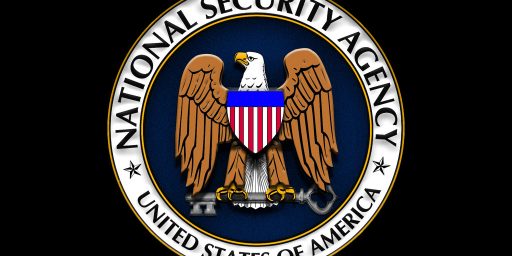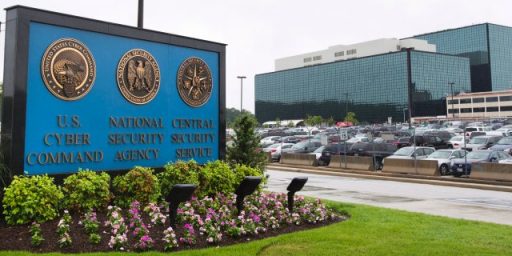Americans Support NSA Telephone Record Program
Nearly two-thirds of Americans support the NSA’s collecting and searching telephone call records in order to look for terrorists, according to a new WaPo-ABC News survey
A majority of Americans initially support a controversial National Security Agency program to collect information on telephone calls made in the United States in an effort to identify and investigate potential terrorist threats, according to a Washington Post-ABC News poll. The new survey found that 63 percent of Americans said they found the NSA program to be an acceptable way to investigate terrorism, including 44 percent who strongly endorsed the effort. Another 35 percent said the program was unacceptable, which included 24 percent who strongly objected to it. A slightly larger majority–66 percent–said they would not be bothered if NSA collected records of personal calls they had made, the poll found.
Underlying those views is the belief that the need to investigate terrorism outweighs privacy concerns. According to the poll, 65 percent of those interviewed said it was more important to investigate potential terrorist threats “even if it intrudes on privacy.” Three in 10–31 percent–said it was more important for the federal government not to intrude on personal privacy, even if that limits its ability to investigate possible terrorist threats. Half–51 percent–approved of the way President Bush was handling privacy matter.
The results aren’t surprising, considering that a similar number supported the more intrusive electronic eavesdropping program when it was announced. The public is widely supportive of programs to catch terrorists.
Indeed, Mark Blumenthal thinks this story might be quite helpful to President Bush, figuring he “can only stand to gain if the public’s attention shifts from his handling of gas prices, the economy, immigration and Iraq to his administration’s efforts to ‘investigate terrorism.'” That’s for sure.





Yet again, the regular press fails to grasp the actual point of their own stories. The issue is not whether the NSA should be conducting surveillance, tapping phones, whatever. The issue is whether they should have to obey the law and get a damn warrant first.
Even during time of war (and that in itself is a whole different argument), you cannot blithely assume every US citizen is potentially guilty & then violate our civil rights to weed out the innocent. I don’t trust _anyone_ that far.
From the NY Sun, this monring.
Any questions, class?
One doesn’t need a warrant to obtain information that’s handed over voluntarily.
Yes, and a marjority of Americans in 1942 thought it was a great idea to throw US citizens of Japanese origins into concentration camps.
DCL: True enough. You’re not suggesting the two are comparable, though, are you? Other than both being done in the name of security?
James, the latter.
Hey, Legion and DCL, question for you:
If you had the choice, would you rather
a) Jump out of the 100th floor window or
b) choose to burn alive in a jet-fueled fire?
I see. Let’s just pass the Enabling Law and suspend the constitution.
Christopher, good question you had:
“If you had the choice, would you rather
a) Jump out of the 100th floor window or
b) choose to burn alive in a jet-fueled fire?”
Here’s my question:
“If you had the choice would you rather
1) live in a country ruled by a man who listens to the voice that he thinks is god, and has unlimited control over his subjects.
2) live in a country ruled by laws, where people have rights their ruler cannot suspend?”
Follow up question:
“If you chose 1 above, why don’t we just let AlQaeda win since they have the same goals, if you chose 2 above, are you willing to risk your personal safety to live in such a country?”
It appears that fear for personal safety is stronger than belief in American ideals for some people. Be brave, be strong, protect our consitution, impeach Bush.
I find it hard to believe that 66 percent of americans are even *aware* of this story so soon after it was published that an accurate gauge of public opinion could be had.
Bithead,
The key phrase is “other lawful authorization.” From the public statements of the Qwest folks, that’s exactly _not_ what happened here. The NSA came in and _asked_ for the records. Qwest asked them to get a FISA warrant. The NSA literally told them they didn’t think FISA would authorize the request. Then the NSA subtly threatened Qwest with loos of gov’t contracts for failing to voluntarily cooperate (i.e., for insisting the NSA do their own job & obey federal law).
Explain to me just how _any_ of that counts as “lawful.
Oh, and Christopher? Die in a fire.
That’s not my choice; it’s just a suggestion.
I guess using the term “die in a fire” definitely qualifies this thread now as a flame war.
We are all good Americans here hashing over the balance between civil liberties protection and protection from being killed by a terrorist. Hopefully none of us will have to make that choice of how to die.
We are now learning that there was congressional oversight with this program. That really deflates many of the arguments against it but not all.
I still see it as less than material in it’s poking into our privacy.
Certainly the way it was leaked, then handled, and now discussed we can agree it’s as much a political football as a real privacy issue. Some see to score points regardless of the true nature of the program.
So the legality seems established, the oversight was there, the actual intrusion into privacy was minimal, and the motives excellent. Why is this still so hard to accept for what it is?
Yeah, well, about that….
His stated objection was that FISA hadn’t approved the system. Problem is, FISA doesn’t apply, here… rather the Communications Assistance for Law Enforcement Act of 1994,did. You know, the one the Democrat Hoouse, and the Democrat Senate approved, and Clinton signed.
And oh, by the way….About the person who rejected the government’s request on those grounds… Joe Nacchio?
You’ll forgive me, please, if I take his estimation of what is it is not legal and moral with a grain of salt. No wonder Qwest is the darling of the left, these days.
Well, I’m not enough of a lawyer to say if this is more of a CALEA thing than a FISA thing. But there are people at the NSA who _are_. And if CALEA gives the NSA the right to simply demand this data, why did they just let Qwest off the hook? When the Qwest execs said “go get a FISA warrant”, why didn’t the NSA just say “we don’t need one” rather than “we don’t think the FISA court will give us one”?
Good try, Bithead, but it still doesn’t add up.
Here we are again. One side defending law and order, the bulwarks of our freedom and democracy, the other defending Bush. What is it about the guy that makes so many actually yearn for fascism. Truly fascinating stuff.
The reasons are simple and often can be explained in this way: what good is a program like that, if the court case resulting from defiance of it is spread all over the media?
That’s the point that was not lost on the CEO nor was it lost on those who leaked that information to the New York Times six months ago.
The prosecution on the counts that I mentioned, just commenced this week after being held up on one thing and another for quite some time.
Think; Absent a leak by the New York Times and whoever else wanted to jump on to that particular bandwagon these points surely would have come up in the criminal trial. So now that this leak is out, the criminal trial proceeds almost immediately? No connection?
Your Bush derangement syndrome has you mislabeling both the circumstances, and the man. The fact is Mr. Bush was acting well within the law. You have yet to answer the law I cited. A little inconvenient fact like that can ruin your whole argument. It has.
Your argument isn’t defending law and order, your argument is defending Democrats, and as you’ll see but a long list of corruption charges being tossed the Democrats these days there’s a major difference between the two that you have yet to account for.
“The fact is Mr. Bush was acting well within the law.” use that one while you can. It’s shelf-life is getting shorter and shorter.
Oh, forgot to mention. Did you see the Newsweek poll today. This story is defunct. Americans have finally had enough.
How so? Are we now issuing laws retroactively?
Hey, Christopher.
Would you forfeit your Constitutional rights in exchange for protection from being struck by lightning?
Probably not.
So why would you do so for protection from something far less likely.
Freedom isn’t free, they say. But it isn’t just the troops that carry the cost. Part of being free is the acceptance of risk that comes with living in a free society. If you want to be perfectly safe, you can trade places with Moussaoui in the Colorado super-max prison, spending 23 hours a day in your cell and rarely seeing another person.
You’d be perfectly safe. Terrorists couldn’t get you despite there being terrorists in the same building. But you wouldn’t be free.
Good point, Jon.
Bithead, no, my assumption is that eventually we’ll enforce our existing laws retroactively.
It always happens that draconian laws are brought out in a society to combat a threat from a few. The only problem is that over time these laws are then applied to the population as a whole. I am sure those that support legislation like this now, if tomorrow the same laws are used against them their support will wane. Unfortunately this is a very slippery slope.
If that’s true, then the president has nothing whatever to worry about. He was, and is acting within the law as I have demonstrated repeatedly.
Again Bithead, use that one while you can. Itâ??s shelf-life is shorter now then the last time you used it.
As _you_ have demonstrated repeatedly?
If I’m spouting off my own opinions, I’ll label them as such – If I’ve got facts to back it up, I’ll put those in, too.
But until you get onto the federal bench, Bithead, you haven’t “demonstrated” anything. You’ve voiced an opinion that I (and notable others) strongly disagree with, but your belief that Bush has broken no laws holds the same amount of weight that mine does – let’s see if Congress actually has the balls to investigate the facts…
Incorrect.
You see, you’re missing the idea that the people we’re talking about ARE lawyers, and already do have some very high priced legal advice on such matters.
In a choice between their take and yours, guess which way that’s going to go?
McG, you’re forgetting that the people we’re talking about are political hacks chosen for their absolute loyalty to Der Fuerher . . . I mean the President. And since when does a neocon like you trust lawyers, anyway?
In a choice between their take and anyone’s who lives in the reality-based world, guess which way that’s going to go for a rational person?